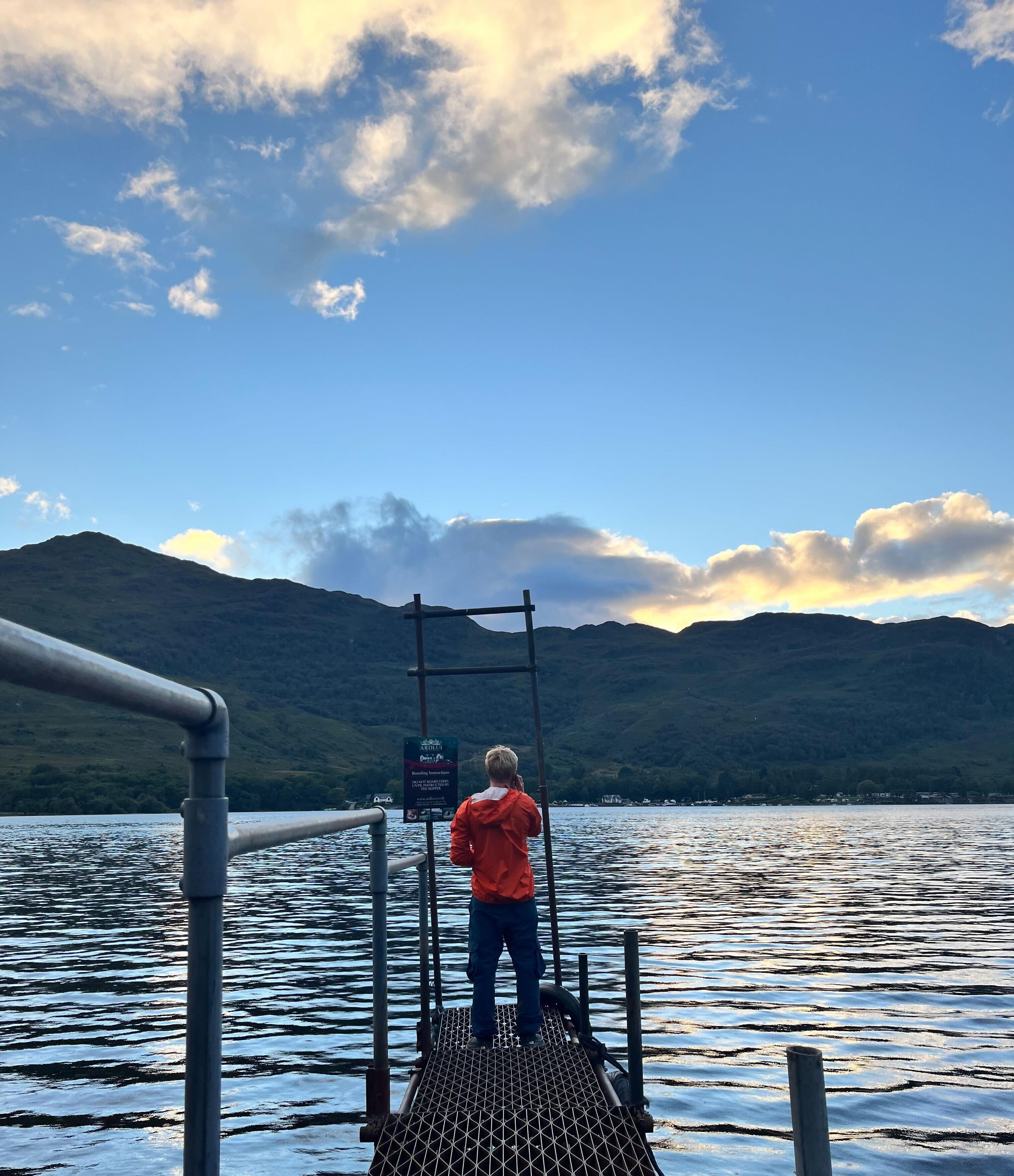
My favourite part of Trainspotting takes place beside Rannoch Moor, in the Scottish West Highlands. It features a tirade from Renton, induced by only a short-lived venture north, and Tommy’s impossibly loaded question, ‘Doesn’t it make you proud to be Scottish?’
“It’s shite being Scottish,” roars Renton in response. “We’re the lowest of the low. The scum of the fucking earth. The most wretched, miserable, servile pathetic trash that was ever shat into civilisation. Some people hate the English. I don’t! They’re just wankers. We, on the other hand, are colonised by wankers. Can’t even find a decent culture to be colonised by. We’re ruled by effete arseholes. It’s a shite state of affairs to be in, Tommy, and all the fresh air in the world won’t make any fucking difference.”
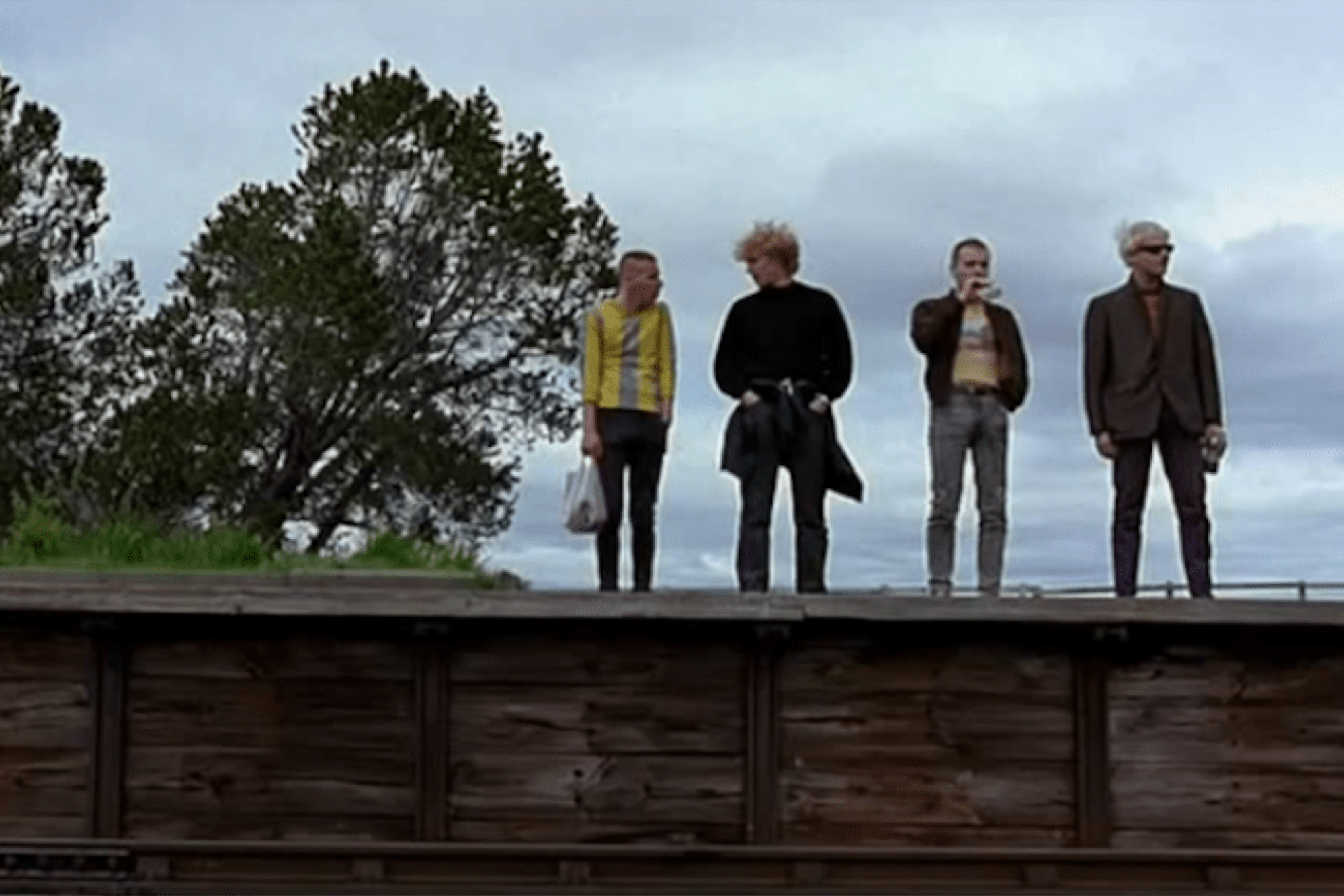
Trainspotting (1996)
Having returned from five days of fresh air, the shite state of affairs is indeed where I left them. To call our rulers effete would be to flatter them, and it, too, would be unfair – misery gatekeeping, even – to claim the shiteness of today as Scotland’s and Scotland’s alone. It’s just shite. UK-wide. Worldwide. Internally. Externally. It’s a shite state of affairs to be in and all the fresh air in the world didn’t make any fucking difference.
Still, should one be so lucky as to try and escape the shiteness, it turns out Rannoch Moor is a near perfect place to forget. It is eerie and endless, a world sedated for as far as the eye can see, unblemished by the human footprint. To answer Tommy’s question, however, it won’t fill you with bristling national pride (not in my experience at least, admittedly on three hours of sleep and after 70 odd miles of walking). It’s not that it’s not awe-inspiring. Rather, where really Tommy went wrong – other than, you know, the heroin that got him – was in expecting irrepressible Scottish pride to begin with. It’s the hope that really kills you.
You see, there’s nothing zealous about our Scottish brand of patriotism. To even label it patriotism seems a mischaracterisation. Patriotism implies enthusiasm and we know better than that. As Renton so wonderfully laid out, the pride of us Scots seems closer to self-loathing than it is self-affection; crucially, it’s just hating everyone and everywhere else ever so slightly more than you hate yourself. I think it’s really rather beautiful.
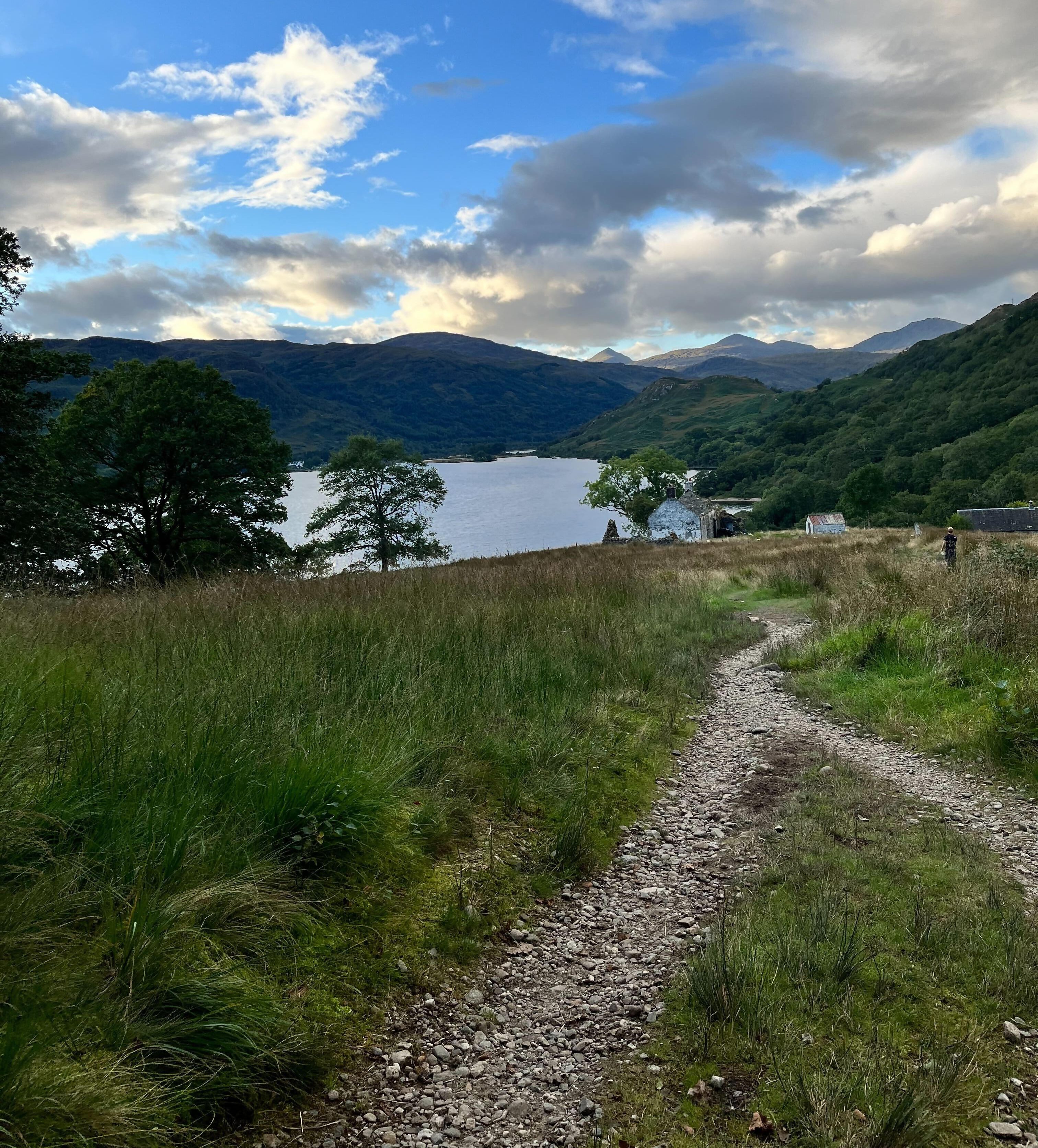
Stretching from Milngavie, just north of Glasgow, to Fort William, in the shadow of Ben Nevis, the West Highland Way is a 96 mile route, founded in 1980. I’d never heard of it six weeks ago, I must confess, but in a strange quest for group self-improvement, myself and two friends, Stuart and Raph, decided we’d walk it, imagining a protracted, relaxing late-summer stroll. The plan was simple: three bags, three hip flasks, one tent, 100 miles, five days walking and a sixth day mooching about Fort William, revelling in our success, before catching the sleeper train back to London. That’s really all there was to it.
Two thirds of us arrived at Rannoch Moor on the morning of our fourth day, climbing up and out of Bridge of Orchy, eventually reaching the swampland that precedes the rise into Glencoe. To this point in the trip, nothing had gone to plan. Within the first half hour, Stuart had cut himself with his own swiss-army-axe and by the end of day two, we’d lost him to a broken boot; we’d ditched our bags with a luggage service, barely had time to stop and enjoy the views, overestimated our fitness, underestimated how far 20 miles a day is and just coughed up ~£400 for a night at Kingshouse Hotel (that last and most expensive decision necessitated by an annual running race in the next town, Kinlochleven, leaving all campsites, hotels and B&Bs full). Deciding to stay at Kingshouse left us over 24 miles of largely uphill climbing to reach Fort William and finish the West Highland Way in the planned five days.
Long before Rannoch Moor, it became clear we’d bitten off more than we could chew. Stuart and I had walked a grand total of 8.3 miles in preparation, and the first day was a shock to the system. After flying past our fellow walkers on the road to Drymen in the morning, our pace was slowed by Conic Hill in the afternoon, and the evening stretch from Balmaha to Milarrochy Bay was borderline surreal. Our bags were too heavy (I cannot emphasise enough how wrong we got bag weight), four of our six thighs were chafing, two of our three backs were breaking, and though feet were broadly moving in front of each other, conversation was long gone. The only question I could really muster was, time and again: “What the fuck are we doing?” Each time I asked, I was met by a brief silence, followed by a deep, painful laughter. None of us had an answer. The magnitude, stupidity and naivety of what we’d signed up to was now clear, and all we could do was laugh.
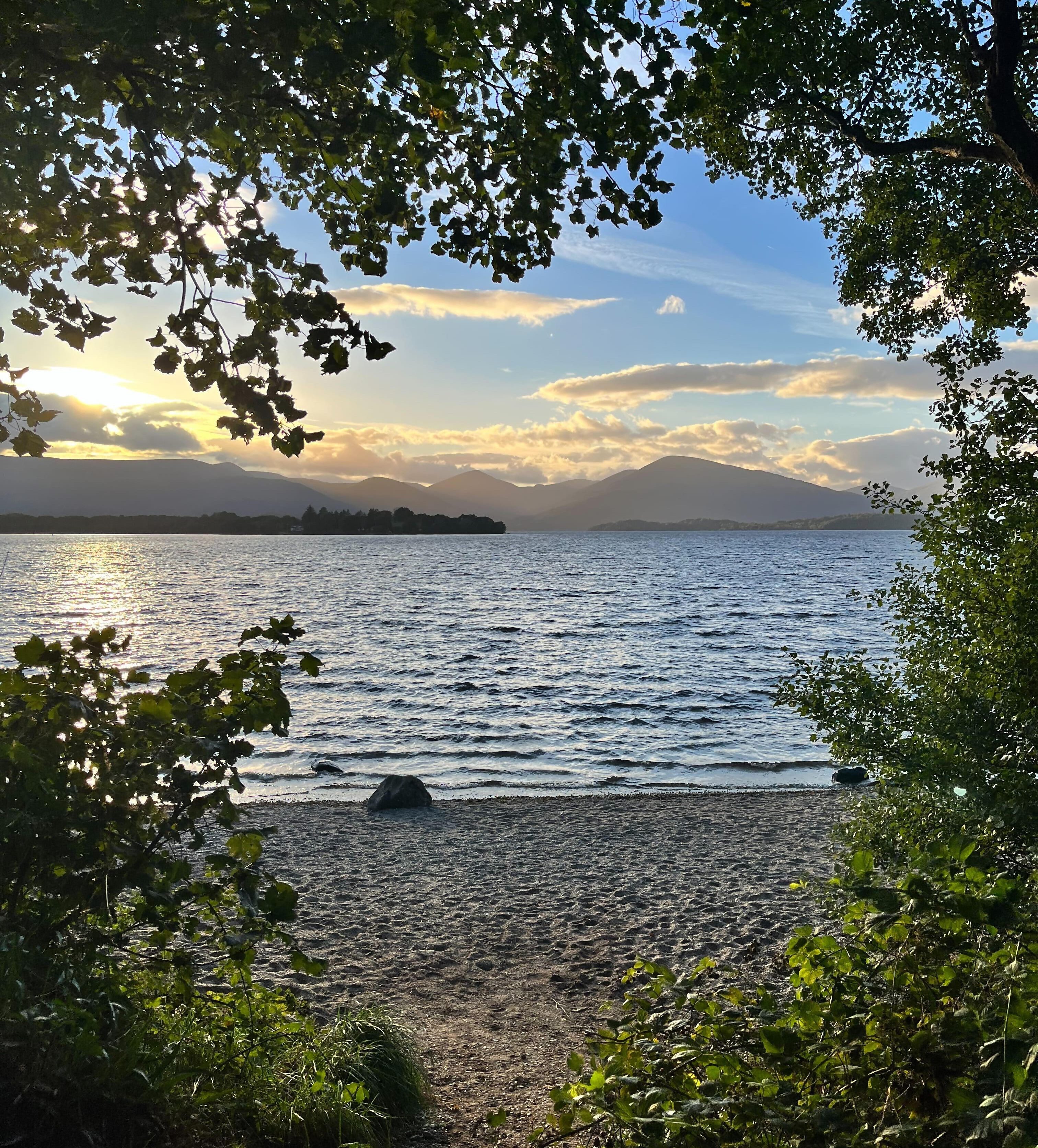
The bonnie shores of Loch Lomond
We stumbled into a campsite in Milarrochy Bay with the sun very much setting on Loch Lomond. I bought a chocolate bar and a can of diet coke and provided negligible assistance as the other two set up our tent. Even at that point, I think, we all still envisioned sitting by a darkening Loch, drinking whiskey and having a smoke, gradually becoming less tired, less sore, less delirious. If anything, however, our symptoms only got worse. I limped to the water’s edge and I limped back again. My feeble attempt at yoga could not prevent my body going into rigor mortis. I crawled into the tent, ate a chicken mayo sandwich, and occasionally mumbled, “What the fuck are we doing?” There was no laughter this time. Either we were too tired or it just wasn’t funny anymore.
Miraculously, something resembling optimism filled the tent when we woke up on day two. We’d all slept alright and the campsite had toilets and tap water and a shop. The sun was shining, the tent went down smoothly and we even cooked some bland, dry porridge. Unlike yesterday’s 23 mile, uphill effort, we only had 19 miles along the theoretically flat coast of Loch Lomond, to the village of Inverarnan today. With bags packed, stomachs filled and Ibuprofen ingested, our legs stuttered into gear and we began to make some decent headway.
When Scotland play rugby, I can tell there’s a part of my mother that just wants us to lose early on. She doesn’t awfully care about the result, and if Scotland get thrashed, at least it’s over and done with. It saves the heartbreak that will inevitably, unavoidably crush me, my brother and my dad for the rest of the weekend, as we witness the Scottish speciality of snatching defeat from the jaws of victory. Optimism only leads to disappointment. Life goes to shite and I am old enough to know better than to hope, let alone believe.
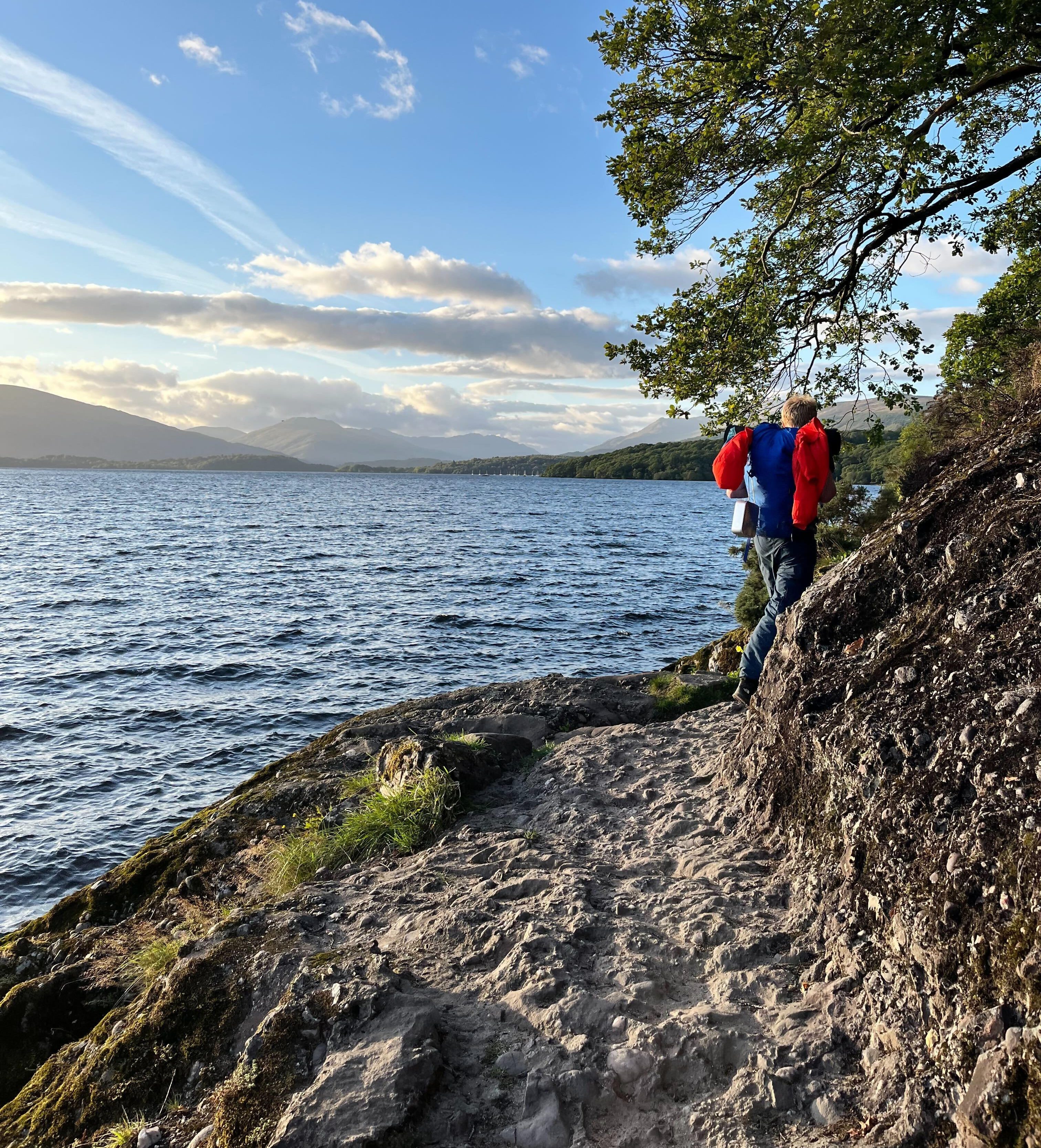
Straight out of Milarrochy, you hug the coast of Loch Lomond. It goes on and on and on. And on. The Loch itself snakes off into the distance, while the path winds its way for miles, uphill and downhill and then back uphill again, scarcely stretching more than ten metres in front of you before veering away, out of sight. At times, it feels like you’re turning back on yourself, and progress was slow going down the never ending path, with its never ending rocks, beside a never ending Loch. It’s a shame we had to walk so quickly, because it’s beautiful. You truly are in the middle of nowhere and the remoteness of the trail, during this stage in particular, amazed me. There’s not a town or a road for miles, and on a still, cloudless day, it seems you have this remarkable corner of the world unto yourself.
We stopped for lunch around 2 o’clock. There was a quiet little beach and if we didn’t have to march on relentlessly, we’d have gone for a swim. It looked like Greece. Scotland in September and it looked like Greece. Blue skies, yellow sands, still waters. Couple spliffs and a ham and cheese baguette, I could have stayed there forever, the mood only dampened by knowing we had to start walking again.
Reluctantly, we trudged on, only to discover that the winding track hugging the coast soon ended, and after a brief climb, you arrive unexpectedly in a forest. Everything is green and the moss-covered tree trunks seem to absorb all sound. The route straightens out, itself marking the only break to the endless green, and we were feeling good again.
And then everything went to shit. I told you it would. I’ve known Stuart for a long time, since we were four. He’s got dark hair and dark eyes and, as of recently, a dark beard. Like me, he’s probably put on ten kilos in the last year and the beard suits him. One of the undiscussed, but mutually understood, features of this walk was that it might help us shed some of those recently acquired pounds, yet neither of us for a second envisioned a work out such as this. For Stuart, in particular, it looked brutal. The outside of his left foot began hurting on day one, and the pain only worsened on the shores of Loch Lomond, neither Ibuprofen nor marijuana providing much relief. Then there was his bag; like I said, all of us had overpacked, but Stuart’s load in particular was absurd, rendering him an overworked mule before we’d even started walking. He was miserable – we could see and hear – but soldiering on bravely until, from behind us, came a particularly pointed:
“Fuck’s sake.”
I turned around to find Stuart flapping his right boot in the air, the entire sole now separated from the rest of the shoe. It looked clownish. Raph tried tying it back together but that lasted no more than 30 seconds, so we sat down to work things out. With no plausible answer to the unspoken question, What do we do now?, we all burst out laughing. I think I was crying with laughter, just looking at this poor bloke, my friend of 20 years, with 20 kilos on his back and jumpers and jackets tied around his waist, standing here, in the middle of fucking nowhere, already at the end of his tether, and now with one boot. Other than a serious injury, this was the worst thing that could have possibly happened and it was therefore also the funniest.
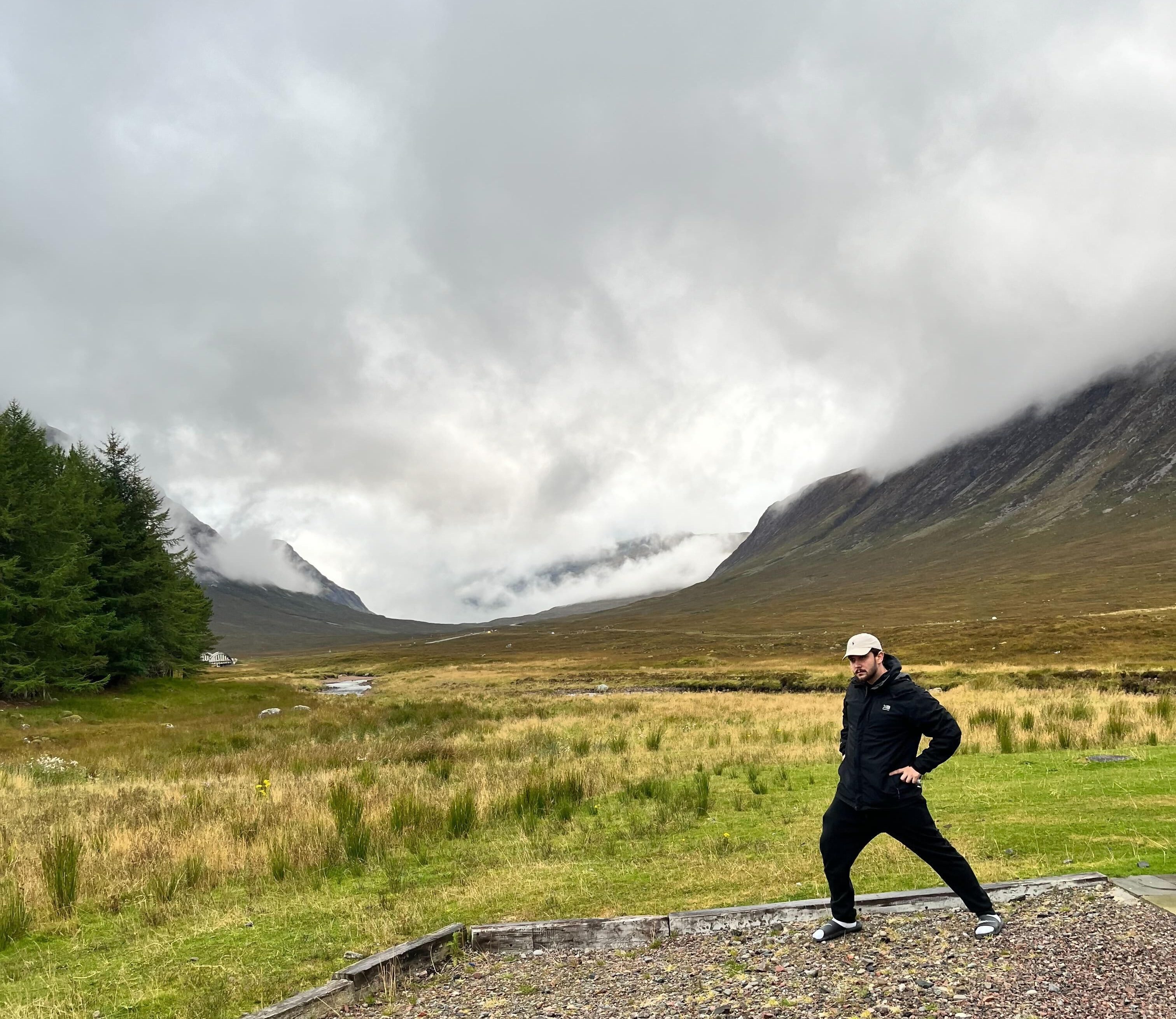
Stuart, outside Kingshouse Hotel.
Inversnaid Hotel was the closest place resembling civilisation, though still a couple of miles up the coast. Stuart groaned and hobbled along in sandals, the two miles taking forever, as Raph and I tried to work out what to do next. Unless Stuart miraculously found shoes in his size at this little hotel, we realised, there was only one option that didn’t scupper the trip entirely: Stuart would need to get a taxi to Inverarnan, where he would meet us for the night, and he could then buy shoes in either Crianlarich or Tyndrum – two sprawling metropolises compared to Inverarnan – that we were passing through the following day.
Once Stuart heard the word taxi, he was sold. I don’t blame him. The bad news was, though, that we really were in the middle of nowhere and there were no taxis available until potentially 9pm. If – and it was a big if – and when the taxi did arrive, it would cost him a whopping £120. You see, it was in this moment that we learned there’s no road up the east side of Loch Lomond. Stuart would have to travel 60 miles back down and around the coast to get to Inverarnan, a village only seven miles away by foot. With daylight beginning to fade, we made the rushed decision to separate. Stuart and the bags would stay in Inversnaid and wait for the taxi, while Raph and I pushed on to Inverarnan. We’d all be together again in a few hours and Stuart could put his feet up until then.
Here, I again succumbed to the dispensation of optimism. For the first hour or so after Inversnaid, Raph and I felt great; liberated from our bags, sun still high in the sky, skipping past any stragglers foolish enough to still be walking, we were flying. But the path had returned to the water and its rocky, winding ways, and as it wore on, the mileage we’d already done began to settle in our legs while the temperature plummeted quickly. With the sun disappearing over the hills for the final time, we made the decision to attempt to find the ferry from Ardleish to Ardlui, on the other side of the Loch. Switching sides would leave us a slightly further distance to walk to Inverarnan, but it would be along the side of a main road and therefore, our maps said, 20 minutes quicker.
The ferry at Ardleish is summoned by the raising of a buoy, hoisted into the sky on a pulley. Raph did the honours, signalling life on these distant shores, and presumably notifying a ship captain to rescue us. Five minutes later and still nothing moved. We phoned the number on the board, but nobody answered. We decided to wait out the duration of a spliff, precious sunlight eking away, and just as we were about to pack it in and plod into the falling darkness, a boat appeared on the horizon.
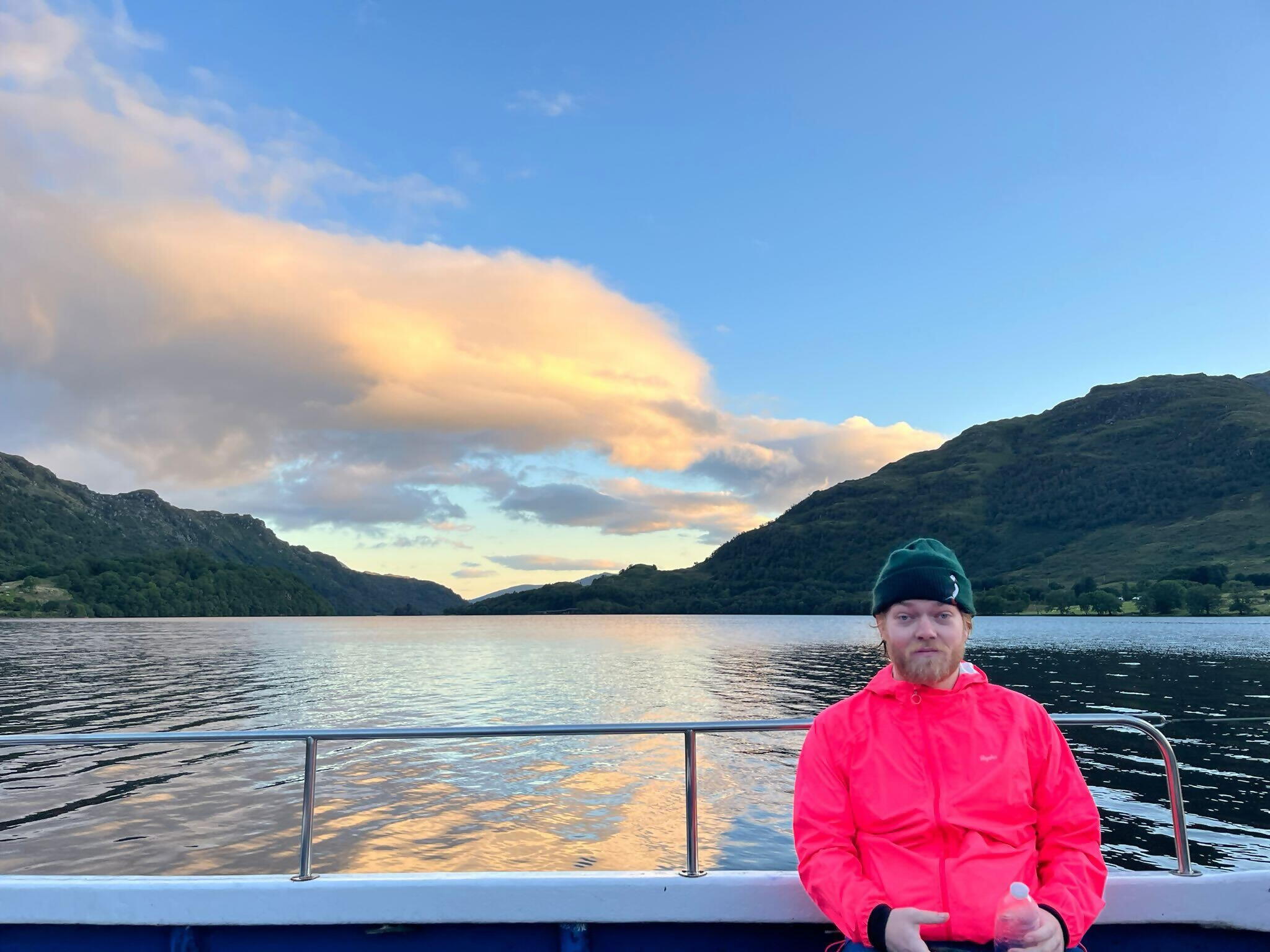
Archie, on a boat.
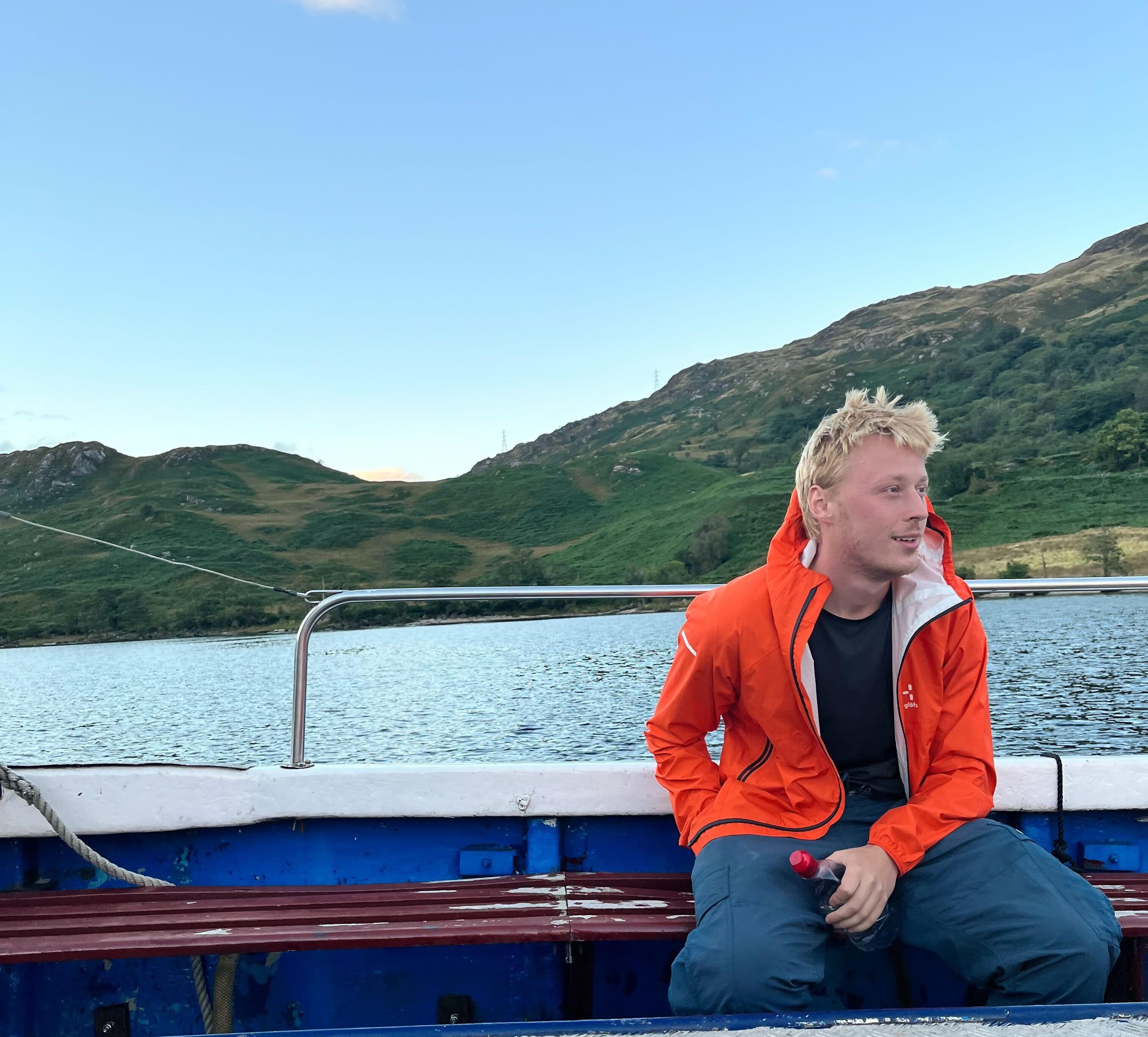
Raph, on a boat.
If you’re wanting to picture this vessel, think less ferry and more fishing boat, driven by a toothless (in the literal sense), rather humourless bloke. It was a contrast to the bearded sailor, ready to regale us with tales, that we imagined, but this chap took us from A to B and it was a beautiful start to the alphabet. I suppose we could have stuck to the West Highland Way track – purists will argue we should – but boats are fun and this got us inside quicker. We are simple creatures.
We disembarked in Ardlui with two miles to reach Inverarnan. It turned out the only way of getting there was walking along the A82, not beside it. It wasn’t dark, yet, but it was dark enough that walking along the edge of a remote A-road was ill-advised and thoroughly unpleasant, our brightly coloured raincoats finding their real worth. We jogged as much as our legs would allow, and half an hour or so later, we’d made it.
Inverarnan consists of one pub and one campsite. We began, of course, at The Drovers Inn, which has stood in the same place for 300 years and, we have since learned, is rumoured to be one of the most haunted buildings in Britain. There was an unnerving assortment of taxidermy in the lobby, I noticed, but we were more interested in a Guinness and a burger and beelined for the bar. It was a good thing we did because every table was booked except for one, and all of the rooms upstairs were sold out. Raph got the first round and came back with the devastating news that food was only available for ‘residents’, but we were welcome to their selection of packeted fried potato, coming in the Salt & Vinegar, or Cheese & Onion varieties. I was expecting to go without a hot meal just hours earlier, but having come so close I could almost taste a pub dinner, suddenly the pill of pints alone was a tough to swallow. That didn’t mean we weren’t going to force it down us. Again, it’s just the hope that kills you.
Midway through the second Guinness, we decided we should probably give the campsite another call to let them know when to expect us. We’d phoned multiple times that afternoon and they had not answered once, but somehow, amidst the chaos, we never read too much into it. Now, with time to think about it, the fear began to set in. It was another 20 minute walk up the road and we had no tent anyhow. I called Stuart – how was he getting on? It didn’t even ring. Text messages weren’t going through and we suddenly realised we’d heard nothing from him since a message saying, ‘Taxi driver not replying’, which arrived just before we got on the boat. We’d found it funny then – piling on his misery – but now the prospect of a night with no bags, no layers, no food, no tent, no wallets and no power banks seemed distinctly possible.
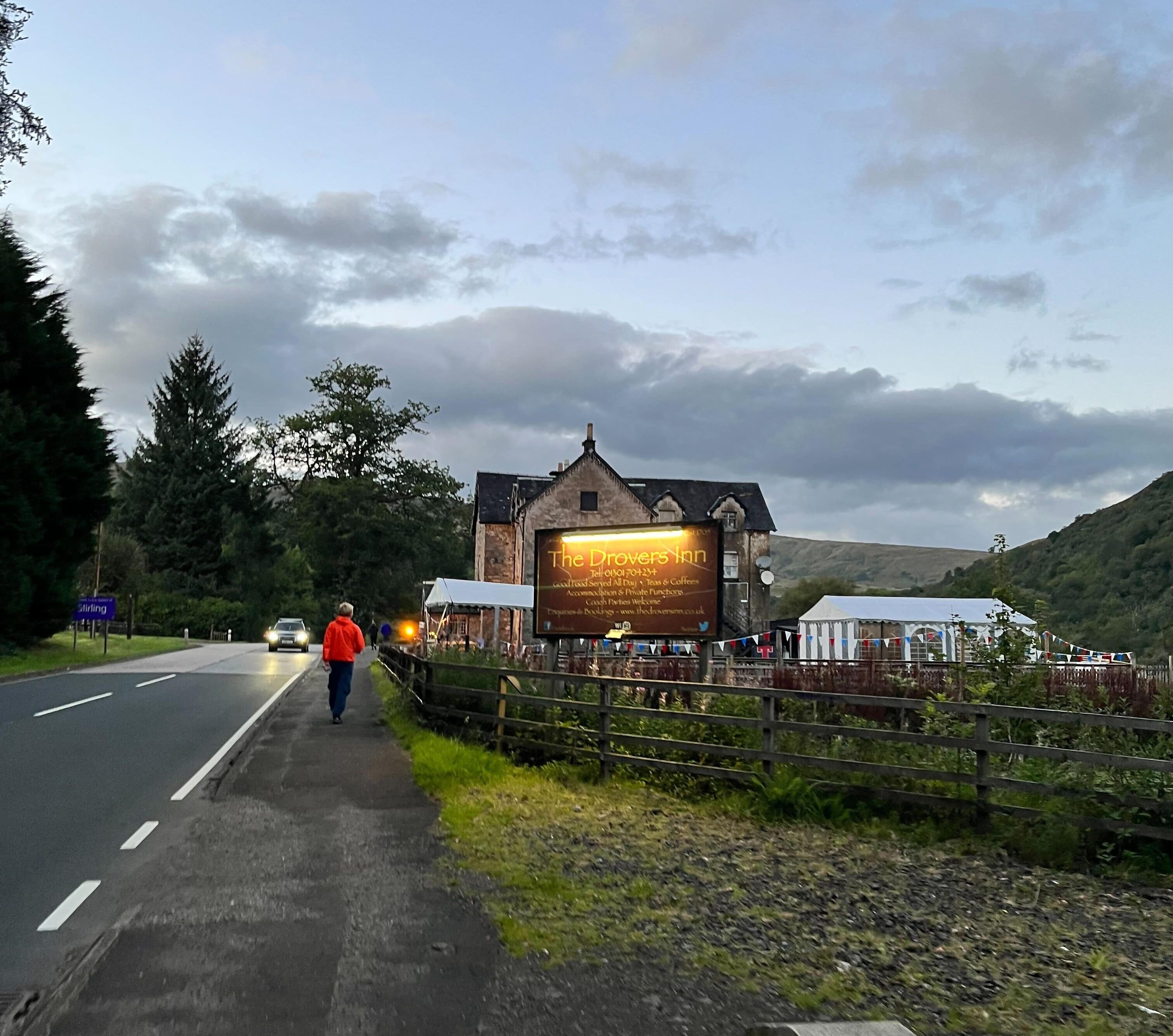
The Drovers Inn, Inverarnan
As we began to internally panic, a young woman appeared at the bar and asked for food. The barman repeated it was for residents only, but after only minimal persuasion, he did a U-turn and agreed to serve her. Raph and I were out of our seats in a flash. Realising the precedent had been set, The Drovers Inn begrudgingly took our order: one steak and Guinness pie, one cheeseburger; two chips. The panic of seconds earlier was replaced by the joy of knowing a piping hot, hearty pub meal was but minutes away, and when it arrived, we inhaled it. Inhaled it. My pie lasted all of five mouthfuls, the chips mopping up any sauce I missed, washed down with another Guinness and a cigarette for pudding.
The afterglow of our meal ended abruptly, when we remembered we didn’t know where we were sleeping. Stuart was still silent and his phone still off. The campsite was not answering and now presumably shut. If we had the tent, we could theoretically find somewhere to wild camp, but we needed Stuart for that.
We went back inside. What to do, what to do. I tried to focus. The nearest place with availability was back in Ardlui, but they only had a bothy (definition: in Scotland, a small hut or cottage, especially one for housing farm labourers or for use as a mountain refuge) and we had no sleeping bags nor way of getting there. Thinking through the options, I concluded that if we heard nothing from Stu, we’d just have to walk through the night. It was the only way to keep warm, the path was off the main road, my phone still had enough charge for a torch if we needed it, and the nights are still relatively short at this time of year. We’d get to Tyndrum, it would just be miserable.
“There’s a bus,” said Raph, summoning me from my daydream/nightmare.
“Where to?”
“Glasgow, I think, but it can stop at Ardlui. It’s here in two minutes.” We necked our Guinnesses, I stopped to take a photo of the lobby’s taxidermy, and we ran outside for the bus. Raph frantically tried to fill in the form to book the bothy at Ardlui.
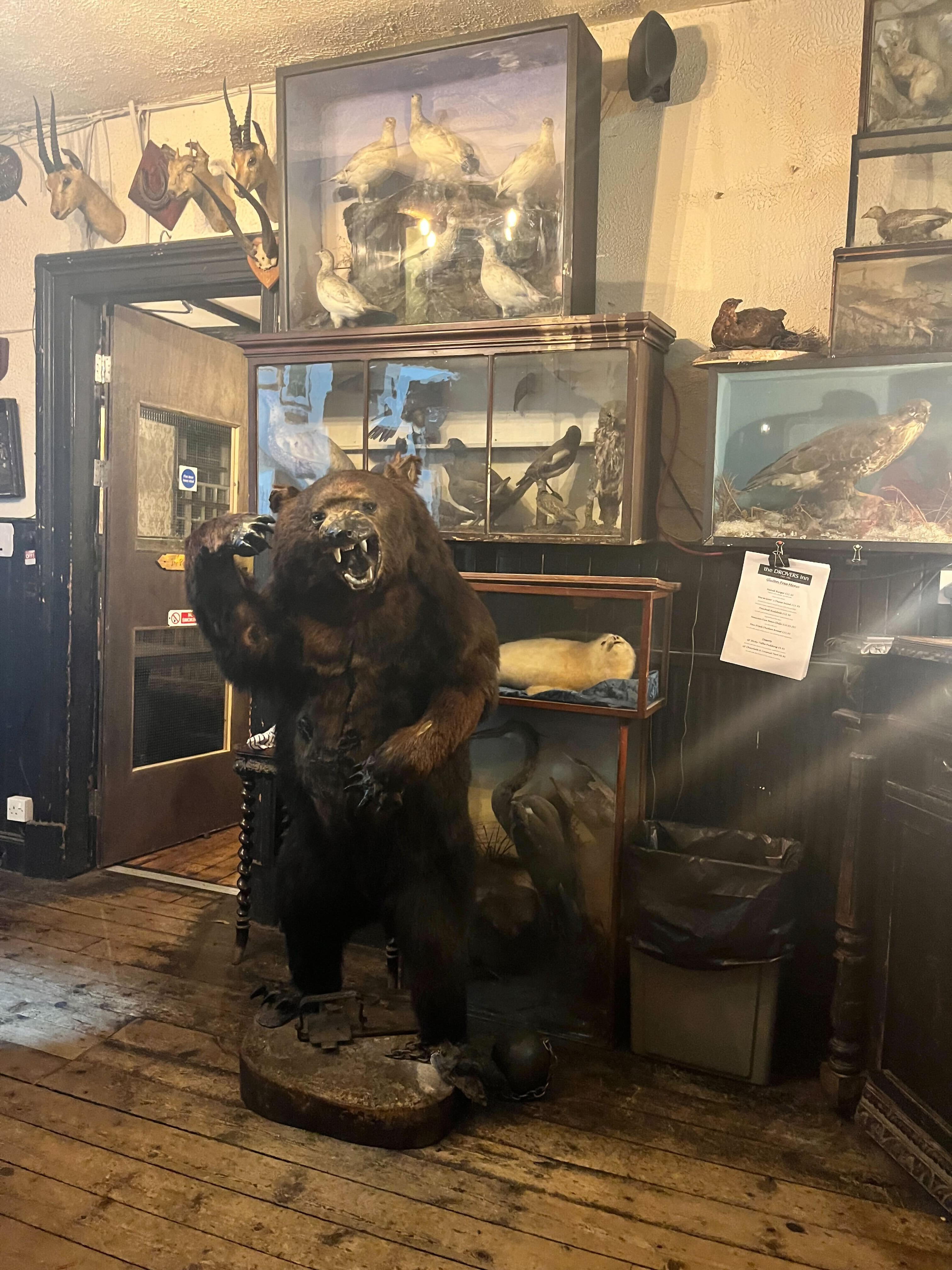
The lobby of Inverarnan’s The Drovers Inn
Even with this divine intervention of public transport, some serious issues remained. First and foremost, Ardlui was not answering the phone and our booking couldn’t be confirmed. If it was closed, we were leaving the safety of people behind; as long as we were with people, I figured, we could appeal to the kindness of strangers. And then there was the silence of Stuart. Without Stuart and the sleeping bags, a bothy only offered so much comfort, and took us back in the direction we came from, into the darkness and the unknown. To get on the bus or not get on the bus?
That decision became immaterial when the bus didn’t show up. Five minutes went by, then ten, then fifteen. Cars whizzed past and Raph still couldn’t get a hold of Ardlui. The one thing I refused to do was to walk along the A82 at night. That was a death wish. I phoned the bus’ CityLink number and reached a woman – we’ll call her Janet – at their call centre.
“Hi, I’m Janet. How may I help you?”
“Hi there,” I shivered, “I’m standing outside The Drovers Inn in Inverarnan and I was just wondering if the 8:56 bus to Glasgow was still coming.”
“Where are you?” Janet sounded kind, more invested in my wellbeing than she needed to be.
“Drovers Inn. Inverarnan.”
“Can you spell that for me?”
“Spell it? Erm, yeah, I hope. I think it’s I-N-.” Raph smacked me on the shoulder and pointed at a road sign spelling it out. He was now on the phone to somebody as well but I wasn’t sure who. “It’s I-N-V-E-R-A-R-N-A-N. Inverarnan,” I declared.
“Okay, I’ve found it,” said Janet. “Let me just have a look and see if we can track that bus. Bear with me one minute, will you?”
“Yep, of course. Thank you.” That music you get when you’re put on hold came on and I asked Raph who he was talking to.
“Stuart. He’s in the taxi. He’s coming to Ardlui. He found shoes.”
World rejoice. It was too much information to process properly, but if I thought the news of food earlier was good, this was euphoric. Even if the bus didn’t come, Stuart could pick us up in the taxi, we could go back to Ardlui and we wouldn’t have to sleep rough. He had shoes. We could wake up tomorrow and go. Everything was going to be alright. And then, over the horizon, came the unmistakable glare of a bus, with ‘Glasgow’ on the front. Raph waved it down and we climbed aboard, practically floating with excitement.
“Are you still there?” Janet suddenly reappeared over the phone as I was finding a seat. “I’m afraid I haven’t been able to track that bus for you.”
“I can confirm I’ve just got on the bus. Thank you.”
“Aw, fantastic. Have a good night.” I might have already forgotten her name, but I’ll remember my Janet’s kindness.
We got off at Ardlui and the hotel looked open. Our booking still hadn’t been confirmed, but email instructions said to ring the warden’s doorbell and he’d open the bothy. After a bit of confusion we found him, explained why we had no bags and why we arrived so late, and he led us to the hut. It had bunk beds and a radiator and fairy lights and a front door, and it was all ours. Now all we needed was our bags. In the meantime, the warden explained, we were welcome to sit and have a drink at Ardlui’s pub, which, it turned out, we had all to ourselves.
Another few Guinnesses later, consumed while laughing at how fortunate we’d been, Stuart arrived. As we shared our dramatic tale of the boat, the pub and the bus, Stuart explained how his waiter – Pete – at dinner was off to South America in a couple of weeks and happened to have a pair of unworn Nike trainers in his room that he was desperate to get rid of. They were the perfect size and he gave them to Stuart for free, who binned the boots there and then. (Stuart’s one wish in this essay was to thank Pete, should he happen to be reading, and wish him the best in Peru, Chile and Argentina.) Back to the story, Stuart also announced that he’d found a service that would take our bags for £15 a day, dropping them wherever we wanted along the West Highland Way.
More celebration, more drink.
Stuart’s foot was still in a bad enough shape that he was going to take the next day off to rest it, but he’d get the bus and meet us along the way. He was here to enjoy himself primarily and the walking was an afterthought – fair enough. Most importantly, the rollercoaster of the evening had somehow led to us sitting in our own personal pub, equipped with a snooker table and a dart board and a host of draft beer. It was perfect, but eventually we retired to our bothy and went to bed.
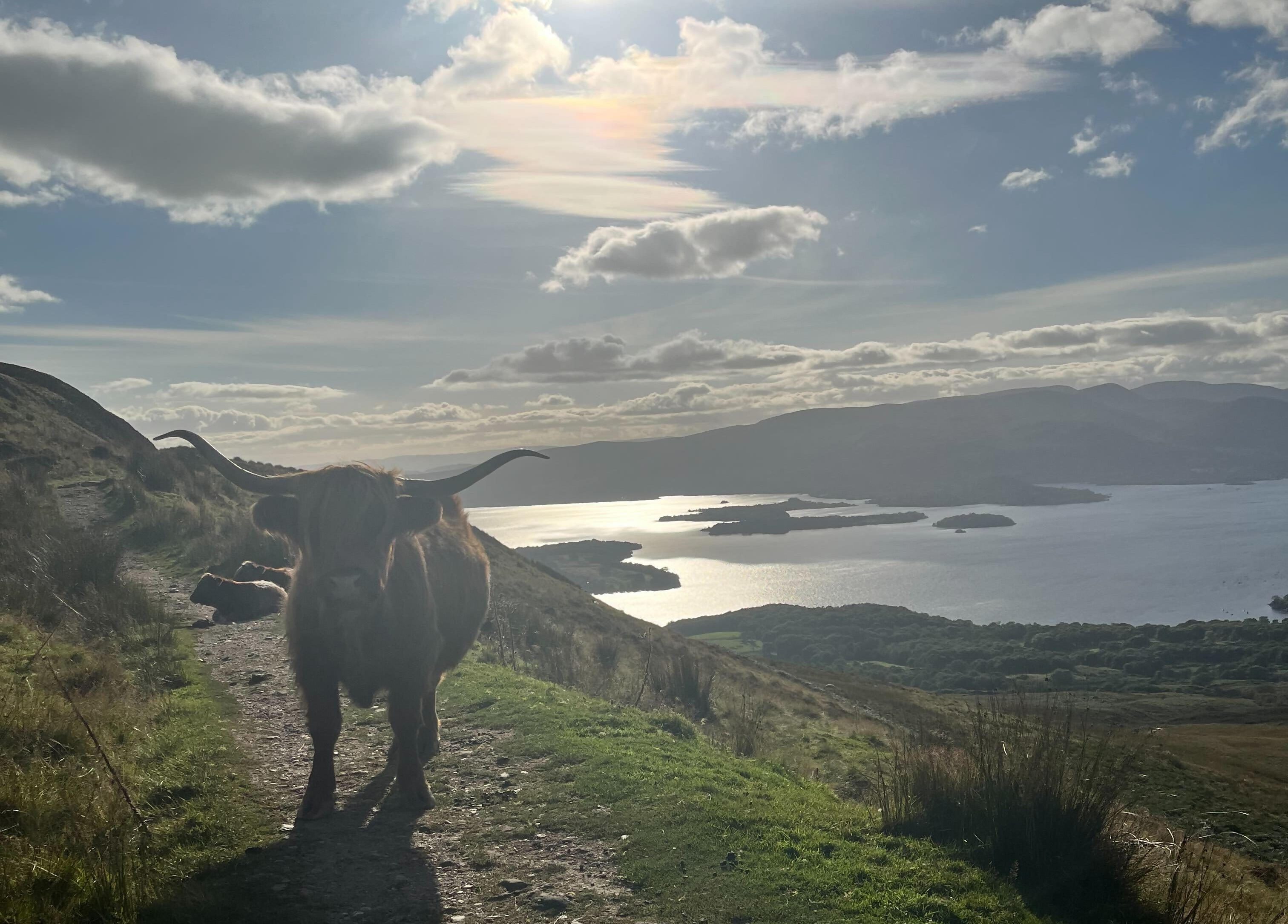
A Highland cow on Conic Hill
We woke up at about 8:30, hungover. At 8:50, I asked Stuart about that bag thing I vaguely remembered we’d booked the night before. Where did we have to leave them and when? Turns out they had to be in the Ardlui Hotel lobby by 9 o’clock, with our names clearly marked on them. The frenzy that ensued somehow resulted in us getting our bags there on time, though the hotel refused to serve us breakfast.
This was part of a broader phenomenon on the West Highland Way: the majority of these hotels, making their money off the hiking route, hate the people walking it. I promise, you’re like second class citizens. They side-eye you or don’t serve you; they make no attempt to mask their contempt, seeing you and your rucksacks and immediately realising you’ve got less cash than the North American bus-tourists, and treating you accordingly. I realise that with these coach tours, hotels can prepare X-amount of meals, likely on pre-filled out forms, but if you’re a restaurant and you’re open and have free tables, it seems fair to expect service. Especially, as is often the case, you advertise online and are the only place for miles in all directions.
Anyhow, day three was easy and, comparatively, uneventful. Crianlarich then Tyndrum then Bridge of Orchy. The difference of no bags and moving along firmer, open tracks (without Stu) made walking an enjoyable experience again, and Raph and I made good time compared to the first two days. We met Stuart for a couple of pints and some lunch at the Green Welly in Tyndrum, before leaving him to get a massage from a lady named Pat, and pushing on to Bridge of Orchy.
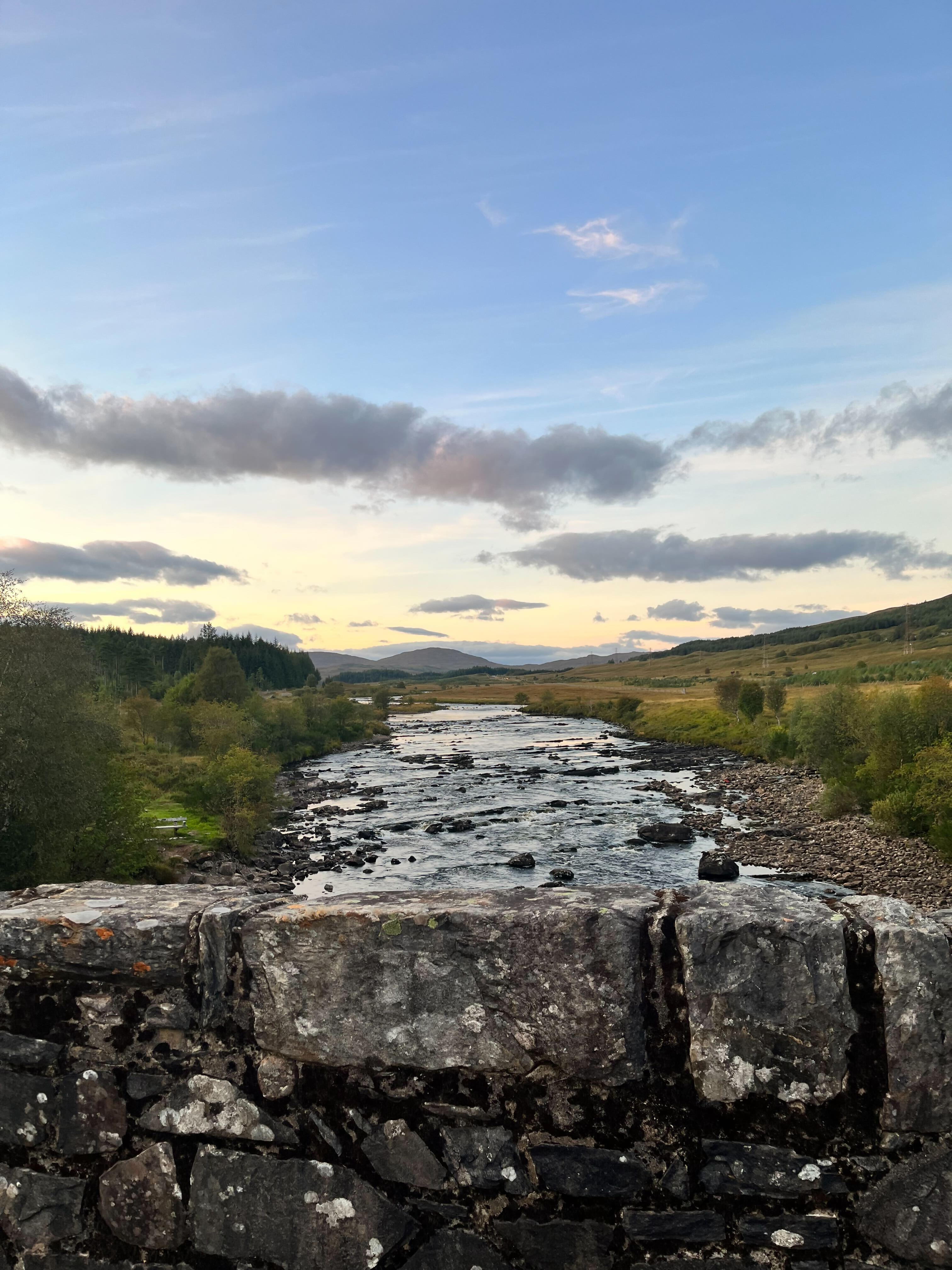
Bridge of Orchy
Bridge of Orchy has a hotel and a train station and not a lot else. We got a beer before the impending coach party arrived, and tried to work out what to do next. We started with the fact that Stuart’s foot was still buggered and he was going to take day four off as well. Then, in theory, we would travel from Bridge of Orchy to Kinlochleven, but when searching for a campsite or bothy in Kinlochleven, they were all full – the aforementioned running race putting pay to any hopes of accommodation there. Our trusty paper guide explicitly said it was near-impossible to wild camp in and around Kinlochleven itself, which presented us with two options: either, Raph and I could walk the 20 something miles and meet Stuart, collect the bags, walk another few miles and pitch our tent on the first patch of suitable ground in the dark; or, we could fork out some cash and have a night of luxury in Kingshouse Hotel, just 13 odd miles from Bridge of Orchy.
If “What the fuck are we doing?” summed up the first two days, the catchphrase for the final three became Stuart’s: “I’m just throwing money at it now.” Rarely, to be honest, do I laugh uncontrollably anymore, and I forgot just how wonderful a feeling it is; when you can’t stop yourself even if you wanted to. Along the West Highland Way, I was laughing so much it hurt. Part of the reason was the stupidity of what we were doing, of course, laughter becoming the antidote when we had nothing helpful to offer, but getting to a position where you really don’t have a clue, takes a degree of stupidity to begin with. You need to leave what you know and I tend to operate firmly within the confines of my comfort zone. I enjoy it there and I enjoy firing half-baked opinions from the hip. Sometimes, though, you need humbled – reminded that nobody has the answers, and that brazen, unwavering self-confidence really is just insecurity, at least so far as I can tell.
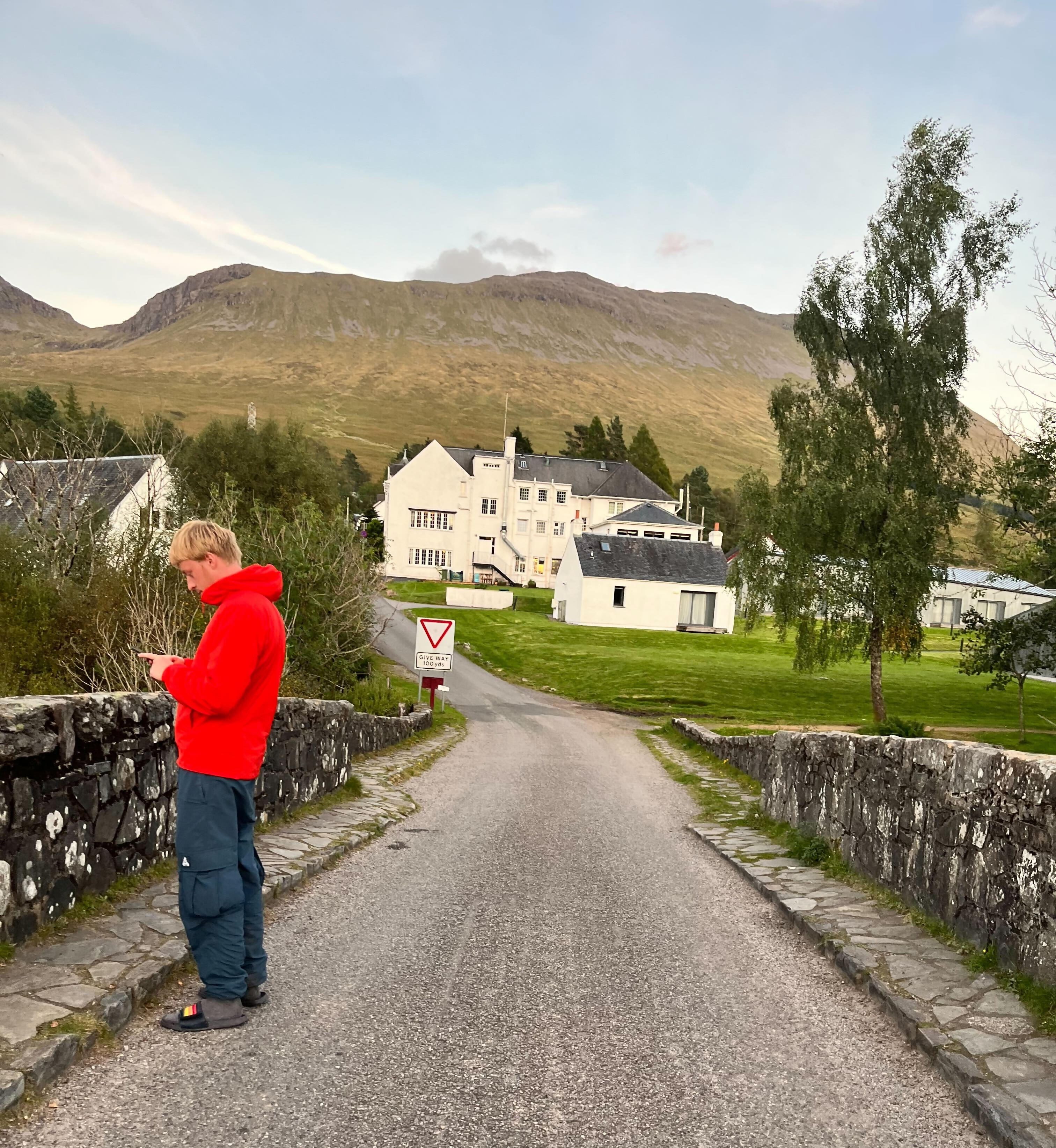
Raph, on Orchy’s bridge, behind Orchy’s hotel
I slept awfully in Bridge of Orchy. We wild camped near the river, but my corner of the tent was on a little bump, and I was either too cold or too hot the whole night, before finally, at about half six in the morning, getting comfortable. By half eight the tent was down. We got a coffee and a flapjack at the hotel and left Stuart and our bags to be ferried to Kingshouse.
According to our instructions, the walk out of Bridge of Orchy was “the most challenging part of the West Highland Way to date.” Mentally, this inauspicious little detail was made easier to stomach by knowing we effectively only had a half day, and once we got to Rannoch Moor, it should be smooth sailing to Kingshouse. We crossed Orchy’s bridge for the last time and started climbing up.
The track was fairly steep at first, but the difficulty paled in comparison to the shores of Loch Lomond. We passed some silly chap trying to cycle up the rocky hill on a bike that was clearly better suited to tarmac, and watching him get on and off, pushing the bike for large stretches, was the most noteworthy thing to happen that morning. It was a little cloudy, but the views still breathtaking as we left the southern monros behind and moved into the flat expanse of Rannoch Moor.
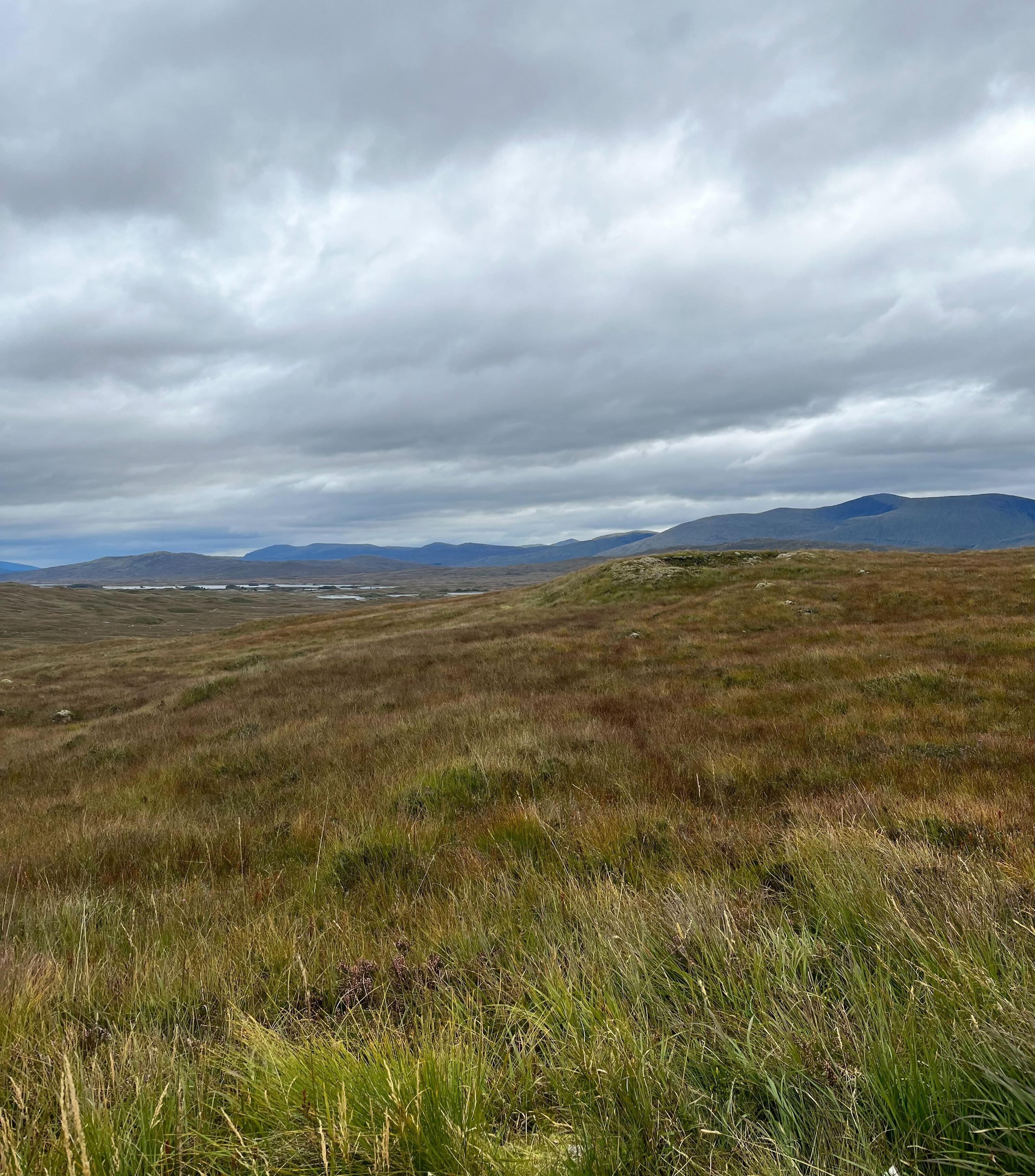
Rannoch Moor
At the time, I didn’t know this was where that scene in Trainspotting was set. The station the boys visited is called Corrour and is over on the other side of the swamp, inaccessible by road, closer to Loch Rannoch itself. When I was little, I went to Kinloch Rannoch a fair few times, a friend of mine’s family having a cottage by the water. We used to play cricket on the road beside their house from sunrise to sunset, and then switch to FIFA08 on PSP while we were meant to be sleeping. I believe that chap’s now salsa dancing in Medellin – I suppose not every Scot is as cynical as me.
Raph and I stopped for a flapjack and some pistachios on Rannoch Moor. For the first time since sipping coffee all fresh-faced and wide-eyed in Milngavie, I felt good. I’d had a good time, absolutely, but I hadn’t felt good, not until now. My legs had grown into the walking, my back was loose after 48 hours free of my bag, and in only a few miles, there stood an establishment with a bath and a bar and restaurant, and room with our name on it. It was only lunchtime and we had the whole afternoon, evening and night to enjoy it. The other morale booster, fuelling this sanguinity, was that Fort William now seemed within reach. Just when I thought all the optimism had been beaten out of me, I believed again. I’m a competitive bastard and I relished the 24 mile challenge that awaited tomorrow. It was effectively a marathon to the finish line and I wanted it, so, so bad.
Kingshouse Hotel looks like a Bond villain’s lair. After four days of body-aching chaos, it looked like heaven. Christoph Waltz could have been plotting the end of civilisation and I’d have walked in for a pint. The fitness could wait for tomorrow; this was, after all, a holiday and the next ten hours were to be enjoyed whole-heartedly. Forget about the money. Forget about the ‘purity’ of camping the West Highland Way. Look at where we are. You get to do this stuff, if you’re lucky, once; just fucking enjoy it. And we did. I couldn’t tell you quite how many beers we had, but I remember the bath and dinner vividly. We carried on laughing like children for the rest of our time there and it was the best hotel money I’ve ever spent.
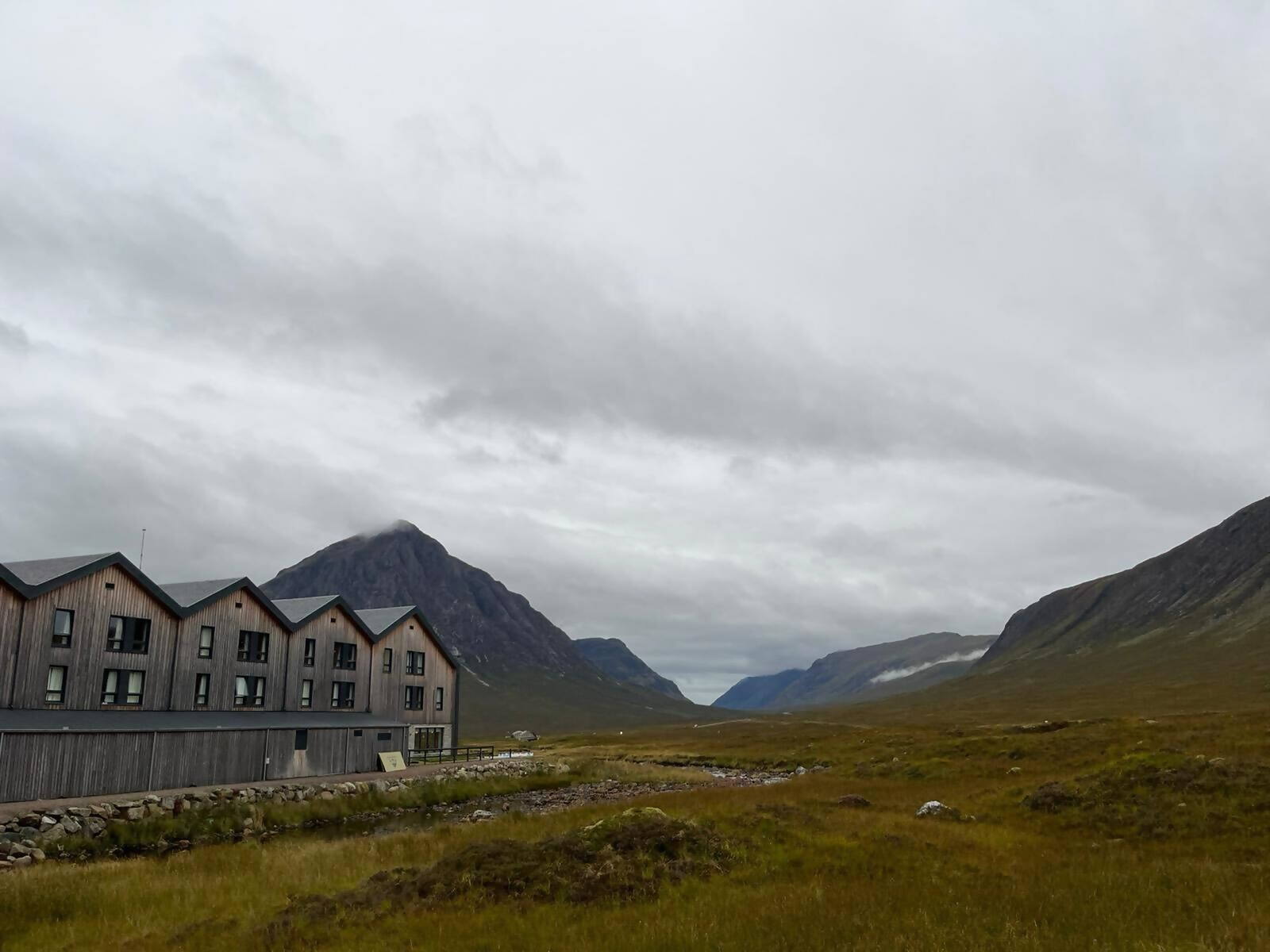
Kingshouse Hotel, Glencoe
We woke up a little before seven and opened the curtains, to discover Glencoe basking in a murky, purple glow. Packed and downstairs 15 minutes later, it turns out breakfast at Kingshouse is a little bit silly. Who knew that being served poached eggs while looking at the clouds rolling through Glencoe post-sunrise is one of life’s great pleasures, somehow enhanced further (this feeling epitomising the strange transformation I had undergone these last few days) by knowing that over 24 miles of uphill walking awaited the second we left the cosy, coffee-smelling confines of that wonderful room.
Raph and I were on the road by 8am. I have known him a lot less time than Stuart. We went to school together once, when we were little, but we weren’t friends and it is only in the last 18 months that I’ve gotten to know him properly. He’s not as brash as I can be, but he’s confident, in a reserved, stereotypically smug French way that I must admit I’m very fond of. He’s got strawberry blonde hair and a knowing grin and, for the sake of this trip, it’s worth mentioning that even if less sporty, Raph’s in much better shape than both me and Stuart. I enjoyed walking with him. Walking as a pair is very different to walking as a trio, and Raph and I developed an implicit understanding of what worked for us. We went at our own pace, one typically 15 or 20 metres in front of the other, dipping in and out of conversation and listening to music.
Devil’s Staircase is the highest point on the West Highland Way, three miles along from Kingshouse. It was the perfect distance to have already warmed up after breakfast, but to still feel fresh for the climb. For all the warnings of difficulty, we got up with relative ease, my lower back giving me just a little bit of trouble towards the top. Here, the views were breathtaking. We were somehow both in the clouds and able to see miles into the distance, all 360 degrees.
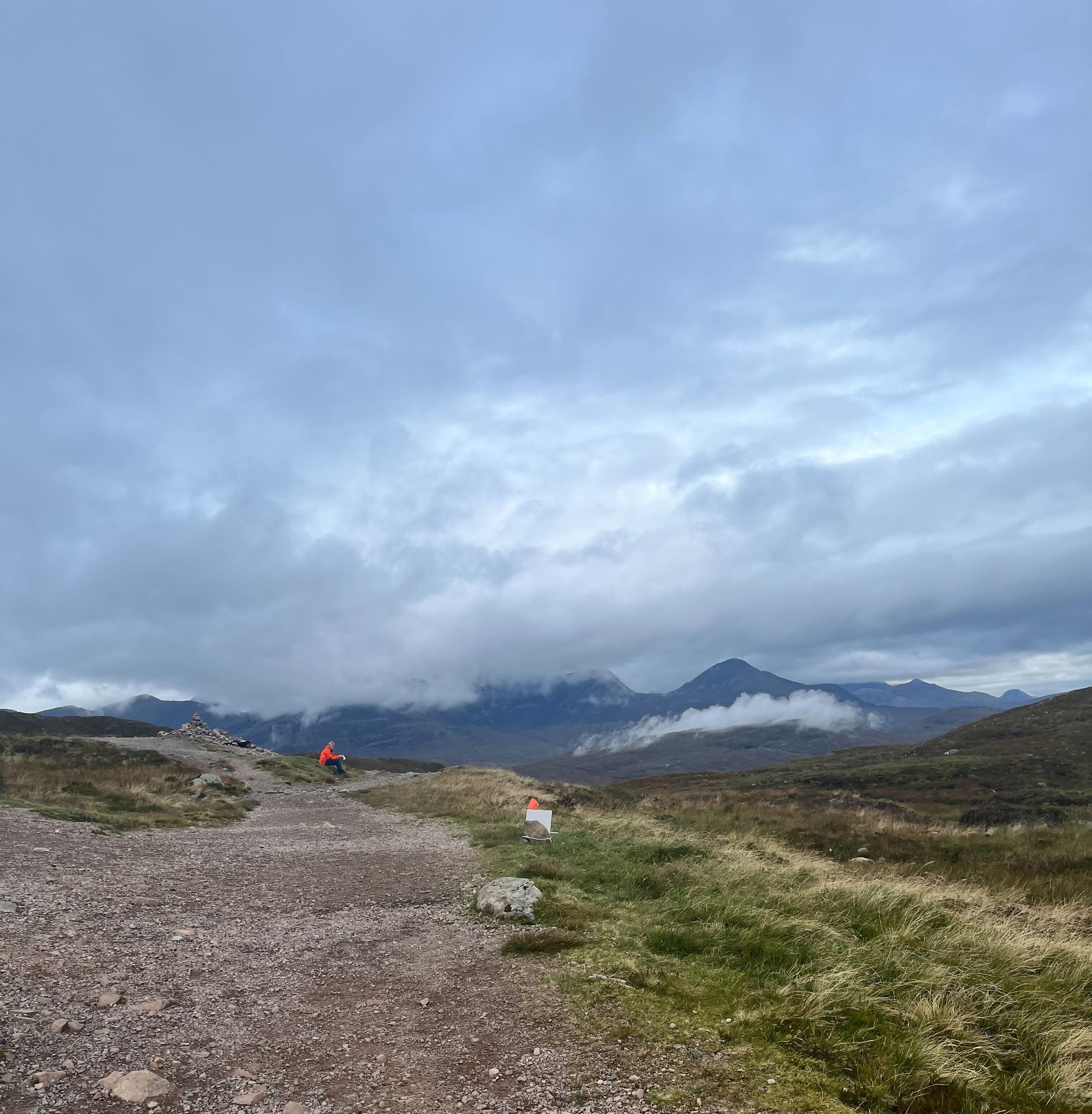
The top of Devil’s Staircase
This, young Tommy, would’ve made you proud to be Scottish, the wind blowing through your hair, your legs burning with the satisfaction of knowing they’ve completed the hardest portion and it’s all downhill to Kinlochleven from here.
Just an hour or so later, we were there, the pair of us jogging parts of the road back down. We were greeted by a large crowd, standing around a finish line with a ribbon all. We didn’t look quite professional enough to pass as full-time mountain runners, I suppose, as we were swiftly diverted to the sidelines, away from the celebration. All sorts of hipsterish outdoorsy folk had gathered in Kinlochleven for this event, and where hipsterish outdoorsy folk gather, you can guarantee there will be an innocuous little coffee van producing the finest flat white you ever done tasted. Caffeinated, Lucozaded and Ibuprofened, Raph and I left Kinlochleven for the final 15 miles of our journey.
The stretch out of town is tricky – far worse than the post-Bridge of Orchy leg of the walk, I would say – but once we got over the hill, we were moving. A great glen opens up and you can see an hour or so into the distance, little dots on the horizon marking walkers we were hunting down and overtaking, the path wide and open, little rivers running across it that you can tip toe over.
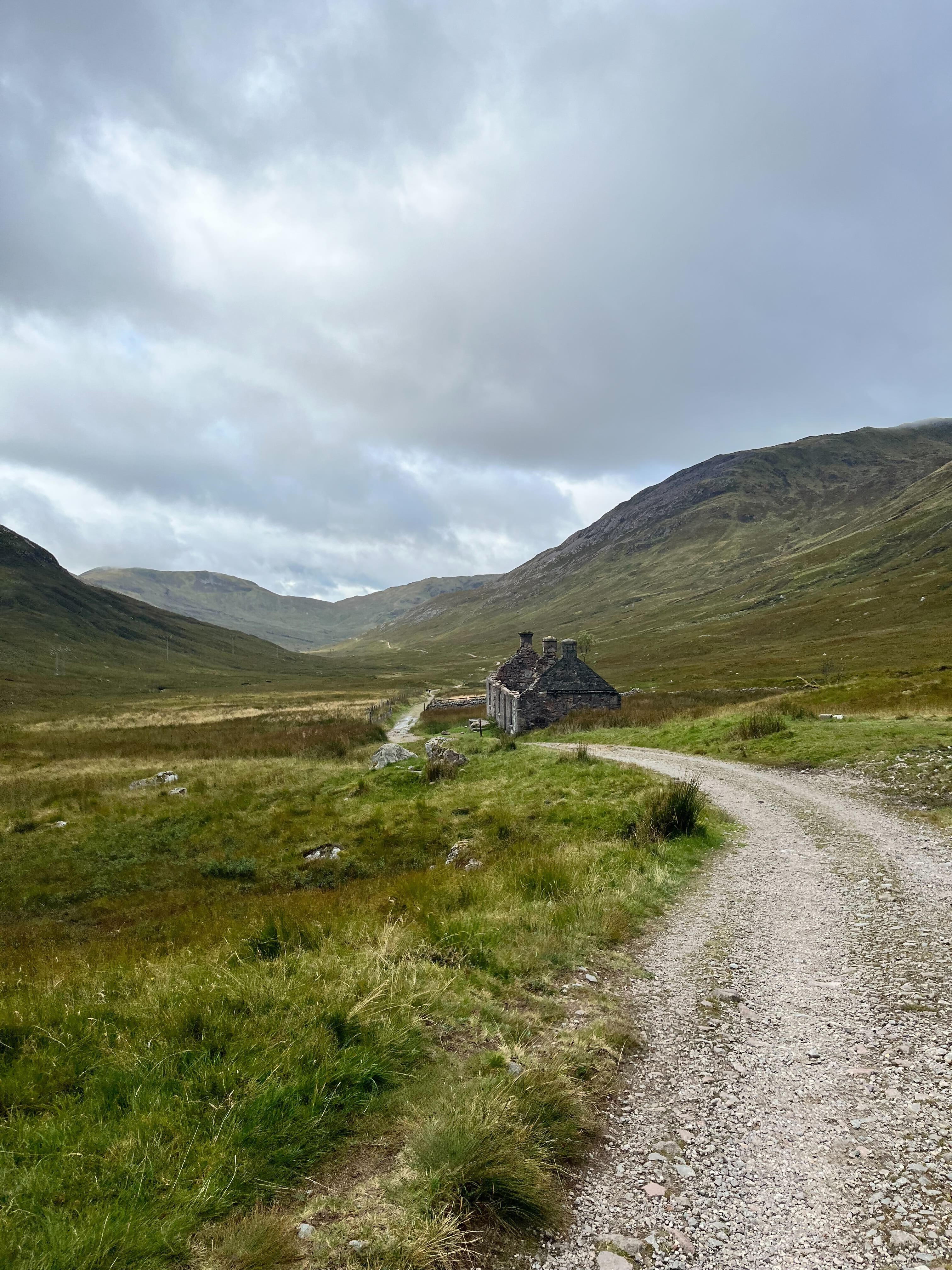
The final stretch: the track from Kinlochleven to Fort William
We understood that on this stretch of the path, it was possible we might encounter a rare mammal, not native to Scotland. Its condition and location we did not know for sure, so I asked each of the people we passed, heading the other way, if they’d seen a creature “limping and probably looking a little depressed.” Sure enough, this mysterious beast had indeed been sighted – my vague description working every time. The first bloke we quizzed reported seeing it on a bridge a few miles down the road; the next two ladies said they’d seen it labouring up a hill, maybe an hour prior; a third interviewee said he had walked past it on a corner, less than fifteen minutes ago.
The chase was on. Raph and I were desperate for some lunch, but with the illusive beast this close, we knew we had to press on and try to hunt it down. More hills, more blind corners, the dots on the horizon were now invisible as we rarely saw more than 50 metres in front of us. We went down a bank, over a river and then there, on the hill in front of us, struggling up the path, stood the creature.
“Stuart! Stuart!” He had headphones in and couldn’t hear us. We broke into a sprint – or the equivalent of a sprint after 90 miles – trying to get into earshot before he disappeared over the top of the hill. “STUARTTTTT!”
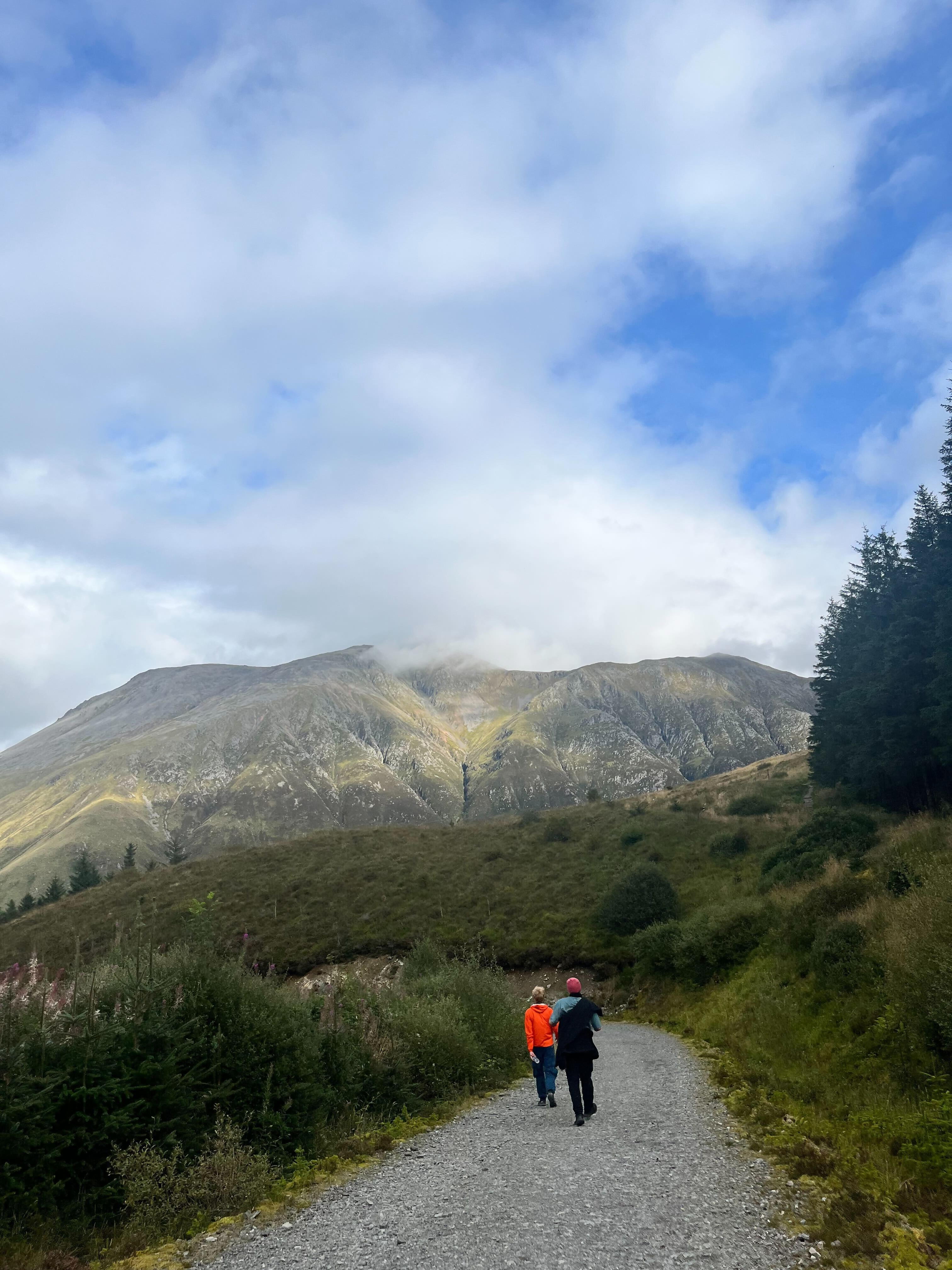
Stuart and Raph approaching Ben Nevis
And then he turned around, extended his arms, grinning like a Cheshire cat. It really was him, in the flesh, back on the West Highland Way with just six or so more miles to the finish. We’d worked out that if he took the bus to Kinlochleven first thing in the morning, when we set off to Devil’s Staircase, he’d have enough of a headstart on us that we could finish as a unit and ride into Fort William as one. The plan had worked to perfection. It was still only around 2 o’clock and we should be in old Fort Bill with time for a beer and a pizza before we had to collect our bags.
I won’t pretend the final half-dozen miles were easy. Long distance journeys seem to be as much mental, as they are physical, and the second you begin to think the end is within reach, it’s not. We winded over and down a few more hills, expecting each to be the last, but it was not until we found a gravel road heading straight downhill that we really knew it was close. Ben Nevis appeared as we exited the woods, towering over us and casting a shadow across the road into Fort William. By the time we got to the official end of the West Highland Way, I really could not have taken another step. Completely, utterly done for.
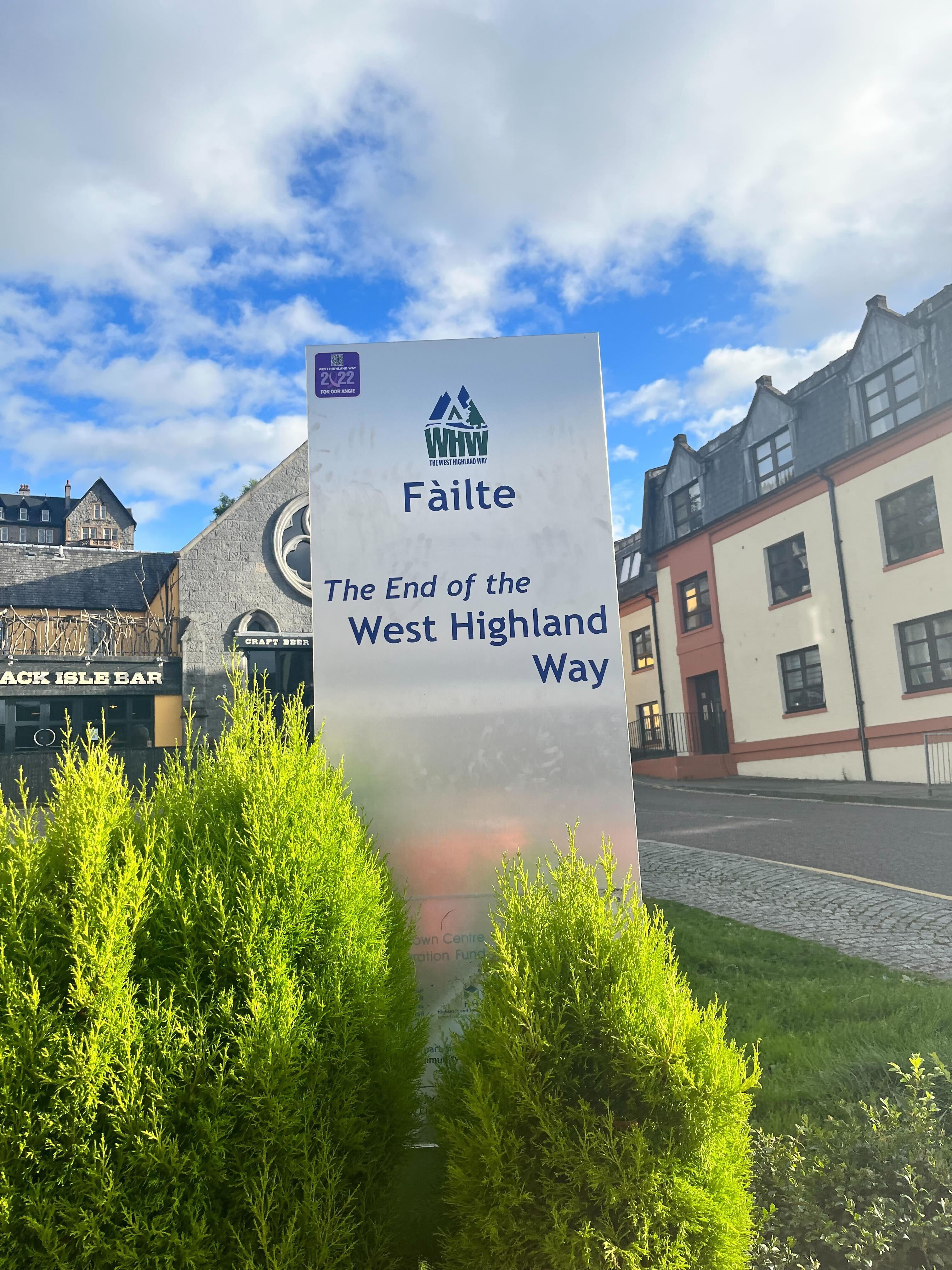
I wish, at this point, I could recount a night for the ages. In truth, we had a pizza and got our bags; we checked into the hotel and then went to find a pub, but it turned out they were all grim and/or shut, so we found a park bench and sat drinking from our flasks instead. After half an hour or so of that, we went back to the hotel to get cigarettes, but the second we sat down on our beds, there was no getting back up. Not the night I expected.
Day six was also strange. It was the Monday of the Queen’s funeral and while we mooched around in the way I imagined we would, it felt more like a comedown than a celebration. Fort William is a depressing place, a glimpse into mid-20th century Britain, an embodiment of how our post-war world rendered once thriving local communities across Britain as lands that time forgot. For as long as you can fly to Fuerteventura from Glasgow for the same price as a train just 100 miles north, it will stay that way, and I think that’s profoundly sad.
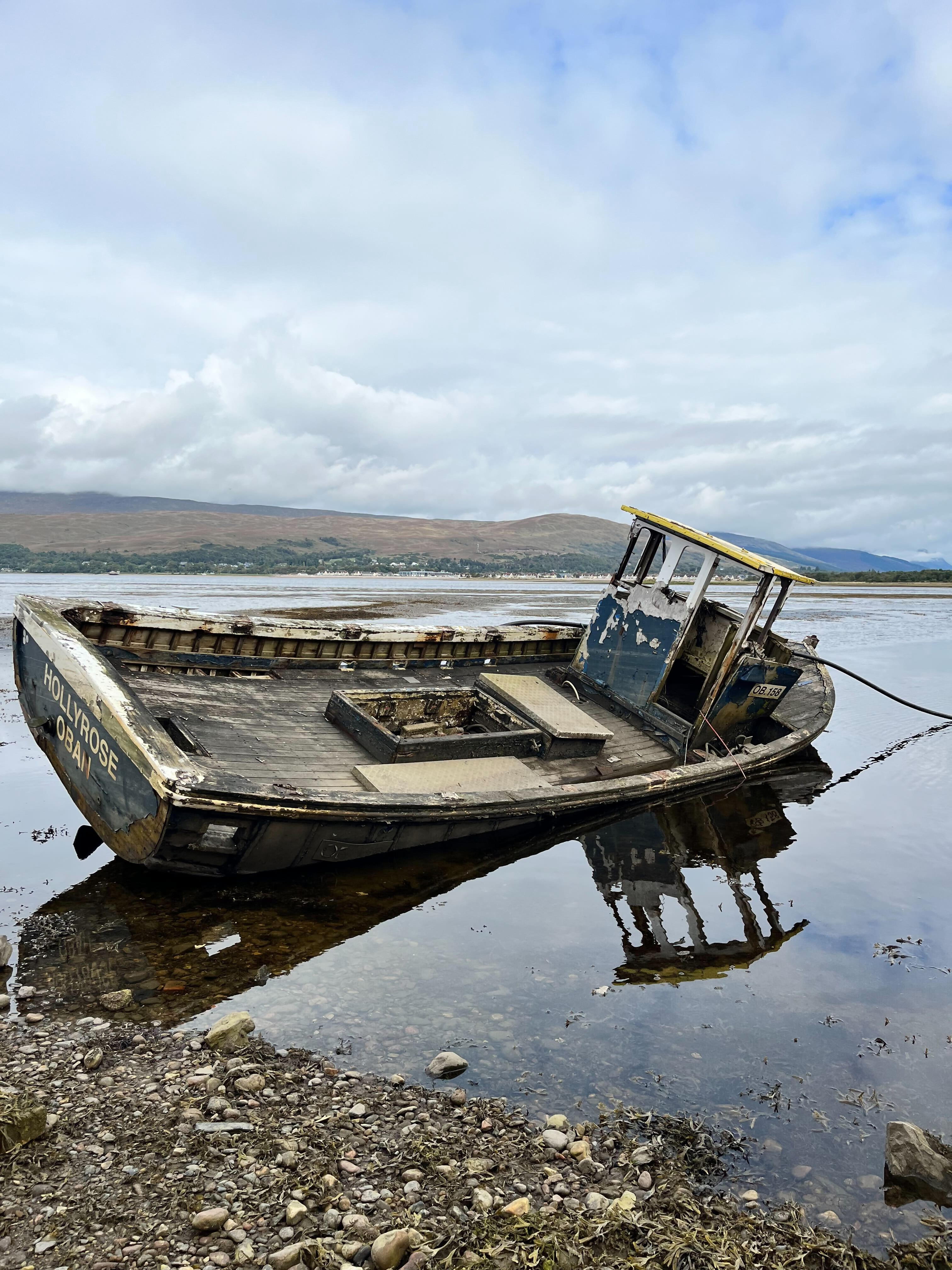
A boat abandoned on the shore in Fort William
Fort William, like the rest of it, wasn’t what I expected, but I’ve realised that expectation itself is an odd one. Forever pitted against reality, we deem expectation to be fruitless if it deviates from the cold, hard fact that follows it. You don’t need me to tell you the value in expectation living up to reality, yet during these last two weeks, I’ve learned the value in simply being wrong. You can’t be wrong on purpose, but you can put yourself in situations where you’re unlikely to get everything right, and I don’t do that enough.
Which brings me onto my next, and final, point. Since getting home, I’ve often asked myself: what on earth made you do that? It was unprovoked, wholly out of character and though I’ve been able to turn the voyage into something resembling an article, I won’t pretend this here is why we went.
The closest thing I have to an answer is simply because we thought we could. We saw a challenge and we believed it was doable. We might have been delusional and ill-prepared, but we were lucky enough to believe. I can laugh about the shiteness of Scotland and write an essay about the futility of hope, but the fact is hope is what kept me walking, and what keeps everyone getting up day in, day out.
You take away the hope, and you get places like Fort William, stories like Tommy’s; you take away the hope, and Raph and I give up on the evening of day one, or Stuart doesn’t battle through the pain to walk the final fifteen miles when he really doesn’t have to.
I was wrong, it’s not the hope that kills you. It’s the absence thereof.



1 Comment
Scot Taxi offers reliable 24 hour cab service in Fort William, ensuring convenience and peace of mind for travelers at any hour. Book your ride with confidence!